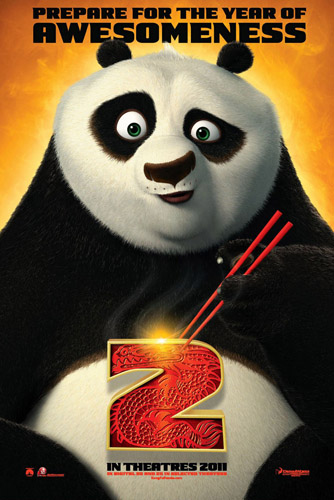US 'panda' movie stirs controversy among Chinese moviegoers
 |
|
The poster of "Kung Fu Panda 2". |
After "Kung Fu Panda", a cartoon movie telling a story about a panda' s Kung Fu master journey, hit China's silver screens in 2008, its sequel, Kung Fu Panda 2, was released in China just ahead of International Children's Day, adding more Chinese elements such as shadow play and lion dancing.
A Hollywood movie was met with an awkward situation on Saturday in China. While fans are standing in long queues to watch the first show, others are advocating a boycott on the American movie with Chinese story elements.
After "Kung Fu Panda", a cartoon movie telling a story about a panda' s Kung Fu master journey, hit China's silver screens in 2008, its sequel, Kung Fu Panda 2, was released in China just ahead of International Children's Day, adding more Chinese elements such as shadow play and lion dancing.
However, some Chinese artists and scholars argue that the movie, produced by DreamWorks, has twisted Chinese culture and serves as a tool to "kidnap" the mind of the Chinese people.
"Children' s Day should be pure. Don' t turn it into a money-making day for Hollywood, and don' t fool our next generation with American 'fast food'," according to an open letter to Chinese cinema managers written by Zhao Bandi, an avant-garde artist hoping to boycott the "Americanized" movie.
Over the past two weeks, Zhao has used his own money to pay to publish circulars in newspapers in Beijing and Guangzhou, urging fans not to watch the movie. "This is a battle," he said.
In 2008, Zhao initiated similar campaigns to boycott Kung Fu Panda, which later set the country' s cartoon box office record, selling tickets valued at 180 million yuan (27.7 billion U.S. dollars).
His move is backed by Kong Qingdong, a renowned professor of the Chinese language with the Peking University, who said Chinese elements have become advertising products to advocate American culture.
"It is a cultural invasion," said Kong.
In the movie, the main character called "Po," a panda which remains a unique animal species in China, is talkative, humorous, lovely and charmingly naive, and is widely believed to be a typical American figure.
However, the panda has won million of fans in China. On China' s most popular microblog website, weibo.com, comments on the movie reached nearly 270 million entries, and the number is still rising. Most of the netizens post questions such as "Why can' t we produce such brilliant movies ourselves?"
"I won't call it a cultural invasion," said Li Jiayi, a Beijing university student. "I see nothing bad for others to use our cultural elements to make a movie."
Yuan Weili, a girl in Shijiazhuang, capital city of north China' s Hebei Province, said at a cinema that she had been waiting three years to watch the sequel.
"I' m a huge fan of Po. In spite of being a cartoon, it is still loved by many adults like me," said the 25-year-old after watching the first show at midnight.
Nine-year-old Zhang Miao watched during the day with his parents. He made a Kung Fu pose and said, "I didn' t see 'Rio' , and I' m not interested in 'pirates' , but I gotta see Kong Fu Panda."
Cao Hui, deputy general manager with Shenzhen Global Digital Creations company, said instead of a "boycott," movie producers should learn from the movie to better make use of Chinese story elements.
"Technically, Kung Fu Panda is not more advanced than Chinese movies, but as for story telling skills, Chinese movies have a long way to go," said Cao.
 0
0 







Go to Forum >>0 Comments